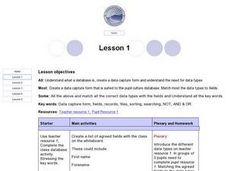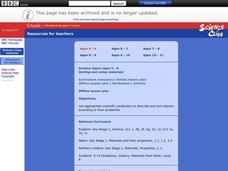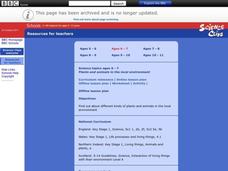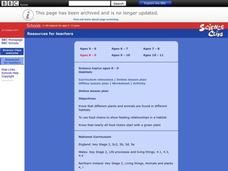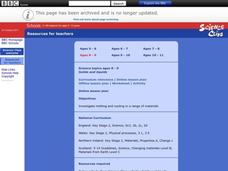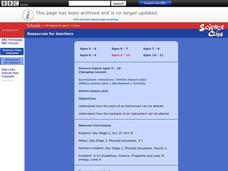Curated OER
Interdependence and Adaptation
Students construct a food web to identify producer, consumer, herbivore, carnivore and predator. They complete an online activity collecting plants and animals and arranging them in the web. They describe the interdependence between...
Curated OER
Fronts
Fourth graders define cold and warm fronts, explain how they are formed and they ways that they affect the weather.
Curated OER
Thunderstorms
Fourth graders investigate the attraction between two different charges to explain the concept of lightning in a thunderstorm.
Curated OER
Database
Second graders collect daily weather information and introduce them to databases.
Curated OER
Weather Predictions
Students play the role of weather personalities by making five day forecasts based on data gathered from observations, weather instruments, and weather maps. Each day a small group makes a class forecast for the next day and reviews the...
Curated OER
Friction
Students are introduced to the concept of friction. Using that information, they discover ways in which friction can be useful. They participate in different activities to see fricition in action. They complete a grid worksheet and...
Curated OER
Sound and Hearing
Students form an understanding that there are many different types of sound. The core concepts are presented in the most basic form for elementary school. Also students investigate how sound travels.
Curated OER
Sorting and Using Materials
Students practice sorting and classifying objects. In groups, they choose a variety of materials and describe how each one looks and feels. They must agree on how to classify each object and share their groupings with the class. They...
Curated OER
Light and Shadows
Students observe and record the apperacne of shadows and how their position and shpae changes during the course of the day. Students measure and record the length oof a partner's shadow at different intervals during the day. In pairs,...
Curated OER
Interdependence and adaptation
Students use keys to identify animals and plants in local habitats. Students are asked if they remember what the word habitat means. Students make a list of three different local habitats and brainstorm animals and plants they might...
Curated OER
Changing circuits
Students identify that there are conventional symbols to represent the components in circuits. Students use these symbols to draw diagrams of circuits. They are reminded that electric circuits can be drawn in diagrams using symbols. ...
Curated OER
Teeth And Eating
Students are introduced to several concepts about milk teeth and permanent teeth. They view photos of baby teeth, complete a worksheet that depicts their current tooth development and identify ways in which to care for permanent teeth.
Curated OER
Solids And Liquids
Students discuss the properties of solids and liquids. They complete a worksheet to show the boiling and melting points of several substances and consider if these factors affect how humans use materials.
Curated OER
Properties of Rocks
Students compare the properties of rocks. They identify objects made of rocky materials such as walls, sidewalks, etc. Students describe and group rocks based on their characteristics.
Curated OER
Forces in Action
Young scholars investigate different forces and draw arrows to signify specific directions of force. Students are then shown a brick and they are asked to draw a diagram which will include labels for the forces that are acting on the...
Curated OER
Life cycles
Students identify and explain the parts of a flower and their role in the life cycle of flowering plants, including pollination, seed dispersal and germination using the Internet. Students will also study and discuss the key points and...
Curated OER
Plants And Animals in the Local Environment
Students observe the various living things they can find outside their playground making sure to look both on the ground and in the air. They develop a large poster Venn digram, as a class, of plants and animals that live in the air, on...
Curated OER
Reversible and irreversible changes
Students define the words "reversible" and "irreversible." They complete a worksheet that shows a number of changes. Students must decide which are reversible and which are irreversible.
Curated OER
Changing Circuits
Students observe an on-line activity to review the basics of electrical circuitry, then research answers to related questions on-line.In this lesson on changing components in a series circuit, students discover how different components...
Curated OER
Habitats
Students investigate the habitats of living things and the cycle of the food chain. In this scientific inquiry online lesson, students examine the habitats of plants and animals as well as the food chain as they sort pictures of living...
Curated OER
Solids and Liquids
Young scholars investigate what happens to solids and liquids when they change from one form to another. In this states of matter lesson plan, students work in groups on a virtual experiment that requires them to collect data regarding...
Curated OER
Moving and Growing
Students learn to understand the role of both skeletons and exoskeletons. In this lesson on exoskeletons, students locate and label bones on diagram of a human skeleton, and observe and discuss bones of chicken and fish. Students then...
Curated OER
Keeping Warm
Students investigate how different types of objects act as thermal insulators. In this online lesson plan, students hypothesize how particular objects act as insulators and then complete the online activity to determine which materials...
Curated OER
Changing Sounds
Students identify how the pitch and the loudness of an instrument can be altered. In this online science of sound lesson, students employ the use of an interactive whiteboard to examine the loudness and pitch of a guitar, drum, and...





